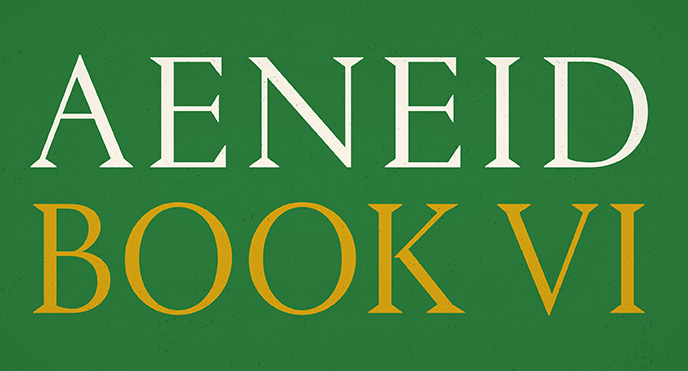Seamus Heaney’s translation of Book VI of the Aeneid follows the hero, Aeneas, on his descent into the underworld. In Stepping Stones, a book of interviews conducted by Dennis O’Driscoll, Heaney acknowledged the significance of the poem to his writing, noting that “there’s one Virgilian journey that has indeed been a constant presence, and that is Aeneas’s venture into the underworld. The motifs in Book VI have been in my head for years—the golden bough, Charon’s barge, the quest to meet the shade of the father.”
We’re pleased to share Heaney’s Translator’s Note and the beginning of his forthcoming translation.
 |
This translation of Aeneid VI is neither a “version” nor a crib: it is more like classics homework, the result of a lifelong desire to honour the memory of my Latin teacher at St. Columb’s College, Father Michael McGlinchey, about whom I wrote briefly in the prefatory note to The Golden Bough (in de Bonnefant & Imprenta de los Trópicos, 1992). The set text for our A-level exam in 1957 was Aeneid IX but McGlinchey was forever sighing, “Och, boys, I wish it were Book VI.” Over the years, therefore, I gravitated towards that part of the poem and took special note of it after my father died, since the story it tells is that of Aeneas’ journey to meet the shade of his father Anchises in the land of the dead. But the impulse to go ahead with a rendering of the complete book arrived in 2007, as the result of a sequence of poems written to greet the birth of a first granddaughter.
The autobiographical sequence in twelve sections, published in Human Chain (2010), was entitled “Route 110” and plotted incidents from my own life against certain well-known episodes in Book VI: thus a bus inspector’s direction of passengers to the bus for Route 110—the one I often took from Belfast to my home in County Derry—paralleled the moment when Charon directs the shades on board his barge to cross the Styx; and a memory of the wake of a drowned neighbour whose body was not retrieved for three days shadowed the case of Aeneas’ drowned, unburied helmsman Palinurus. It was a matter, in other words, of a relatively simple “mythic method” being employed over the twelve sections. The focus this time, however, was not the meeting of the son with the father, but the vision of future Roman generations with which Book VI ends, specifically the moment on the bank of the river Lethe where we are shown the souls of those about to be reborn and return to life on earth.
“Route 110” also ends with birth and the whole sequence is dedicated to “one / Whose long wait on the shaded bank has ended.” And so, elated and inspired by having completed the sequence in thanksgiving for that infant birth, and in memory of the man who first turned my ear and temperament to Virgil, I began work on a complete translation of Book VI. Yet as anyone familiar with this work knows, the beginning and middle of that book are alive with poetic and narrative energy, but not so the ending. By the time the story reaches its climax in Anchises’ vision of a glorious Roman race who will issue from Aeneas’ marriage with Lavinia, the translator is likely to have moved from inspiration to grim determination: the roll call of generals and imperial heroes, the allusions to variously famous or obscure historical victories and defeats, make this part of the poem something of a test for reader and translator alike. But for the sake of the little one whose “earthlight” broke in late 2006, and the one who sighed for his favourite Virgil in that 1950s classroom, it had to be gone through with.
Michael McGlinchey created an inner literalist who still hunts for the main verb of a sentence and still, to the best of his ability, disentangles the subordinate clauses, although usually nowadays with the help of a crib from the Loeb Library or the old Penguin Classics. Yet nowadays too that sixth-form homunculus must contend with a different supervisor, a writer of verse who has things other than literal accuracy on his mind and in his ear: rhythm and metre and lineation, the voice and its pacing, the need for a diction decorous enough for Virgil but not so antique as to sound out of tune with a more contemporary idiom—all the fleeting, fitful anxieties that afflict the literary translator.
Aeneid Book VI
In tears as he speaks, Aeneas loosens out sail
And gives the whole fleet its head, so now at last
They ride ashore on the waves at Euboean Cumae.
There they turn round the ships to face out to sea.
Anchors bite deep, craft are held fast, curved
Sterns cushion on sand, prows frill the beach.
Now a band of young hotbloods vaults quickly out
On to the shore of Italia, some after flint
For the seedling fire it hides in its veins,
Some crashing through woodland thickets, the haunts
Of wild beasts, pointing amazed at new rivers.
But Aeneas, devoted as ever, has taken the road
Up towards a fort, the high seat of Apollo,
Then on to a place apart, a vast scaresome cavern,
The Sibyl’s deep-hidden retreat. There the god breathes
Into her, overwhelmingly, knowledge and vision,
Opening her eyes to the future. Before long
They pass through the golden precincts and groves
Of Diana, the goddess of crossroads.
Seamus Heaney (1939-2013) received the Nobel Prize in Literature in 1995. His poems, plays, translations, and essays include Opened Ground, Electric Light, Beowulf, The Spirit Level, District and Circle, and Finders Keepers. Robert Lowell praised Heaney as the “most important Irish poet since Yeats.”
YOU MIGHT ALSO LIKE:
Celebrating the Life and Work of Seamus Heaney

